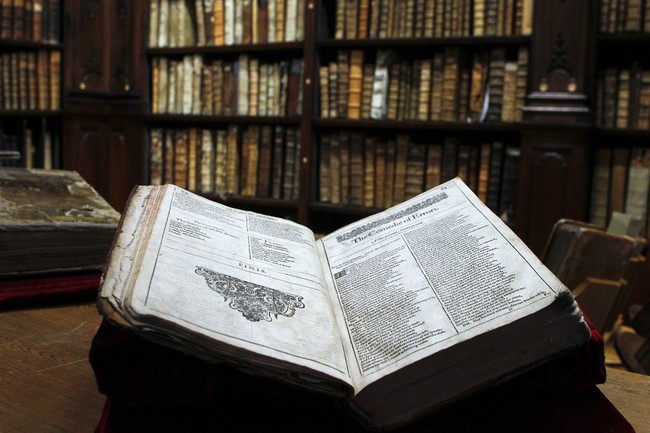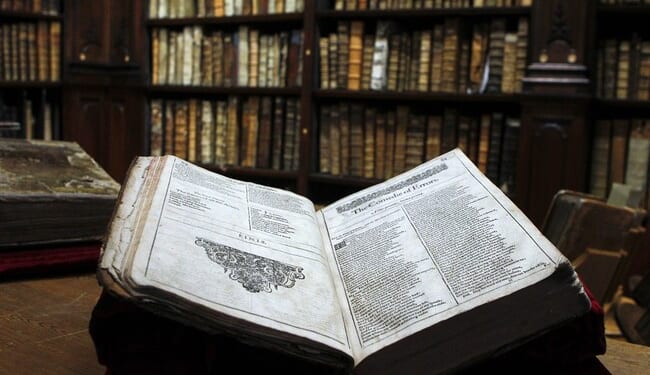
Aside from her horrible taste in men, I believe my wife is the perfect woman. One of the things that she sweetly tolerates is her husband’s rather odd fascination with books. I haunt garage and yard sales in the hope of a treasured volume. Years ago, a man used to hold used book sales in our town, in which most books went for between one and five dollars. Yes, I had to pick through copy after copy of the “Twilight” series and romance novels, but there was gold to be mined in them there stacks. The other day, I wandered into the house with a 1945 copy of James Thurber’s “The Thurber Carnival,” which I rescued from a truck bound for the landfill. It was a steal at $5. My wife always smiles when she sees me with the latest haul and, on occasion, wryly asks if I am buying the books because they will look good on the shelf and convey the impression to the casual observer that I am a man of letters. On those occasions, I assure her that I will eventually get around to reading them all, provided I live to be 127.
There are worse habits a man can have.
Lately, if I am at a chain retailer or even my local library, I have been having trouble finding the “classics.” There are many such books on my bucket list, which I cannot locate. To be fair, when it comes to fiction, there is usually a smattering of titles. But non-fiction? Not so much. My library used to have a set of books that had been donated long ago by some benefactor. The collection included works by people such as Augustine, Aquinas, Locke, Rousseau, and similar authors. When I was feeling ambitious, I would go and check one out. On my last trip to the library, I noticed the collection was missing. I asked the librarian, who told me the entire collection had been “weeded” because no one was checking the books out. She would, however, be happy to order me individual titles if I was so inclined. I inquired about the fate of the books, and she told me that the collection had been sold in a previous book sale. I hope the buyer was someone who treasures them or at least preserves them from the jaws of the recycling machines for future readers.
I recently finished slogging through Umberto Eco’s “The Name of the Rose.” I say “slog” because while it is indeed a fascinating murder mystery, much of the book is devoted to exposition, monologues, and dialogues having to do with the conflicts and politics of the Medieval Catholic Church. And there are sentences and small paragraphs in Latin, which Eco does not translate.
I bring up “The Name of the Rose” because the antagonist in the book is murdering or arranging for the murders of his fellow monks in order to keep a particular book hidden. In this case, it is Aristotle’s “Poetics,” specifically, the section dealing with comedy. The antagonist believes that laughter and mirth are antithetical to the Christian life. If a book in which a respected philosopher legitimizes comedy is read, it will mean nothing but trouble for the church and God’s people. So, instead of being a center for learning, the monastery library in question becomes a place of secrets and knowledge that can never be disseminated.
I don’t believe that my local library rid itself of the collection of Western thought in an attempt to suppress it. In the digital age and the era of graphic novels, not to mention a flood of woke titles hitting the shelves every week or so, I have little doubt that people were glossing over the old hardbound volumes. Anyone who might have stopped to leaf through the books may have found them tedious and outdated. And reading one can be tough sledding. And, after all, who wants to read the Writers of the Patriarchy, even if their works do form the foundation of Western philosophy? I suspect that rather than staging a purge of such books, the “cultural managers” of the 21st century, in addition to deciding to no longer teach these subjects, are allowing these books to slowly lapse into oblivion. Rather than banning these books outright, the cultural managers are letting attrition run its course. Why burn them when you can simply wait for them to disappear? It isn’t the library’s fault. The interest in intellectual pursuits may be being bred out of the populace in favor of bread and circuses.
Should we make room for new authors? Of course. But I question the wisdom of and see the potential danger in shoving Dante, Milton, Voltaire, and de Tocqueville aside to make room for “Fifty Shades of Grey” or another dissertation on the intricacies of gender queer theory.
In the meantime, if anybody has some spare Homer, please hit me up. I will happily trade you three Stephenie Meyer books and one Amish romance novel.

